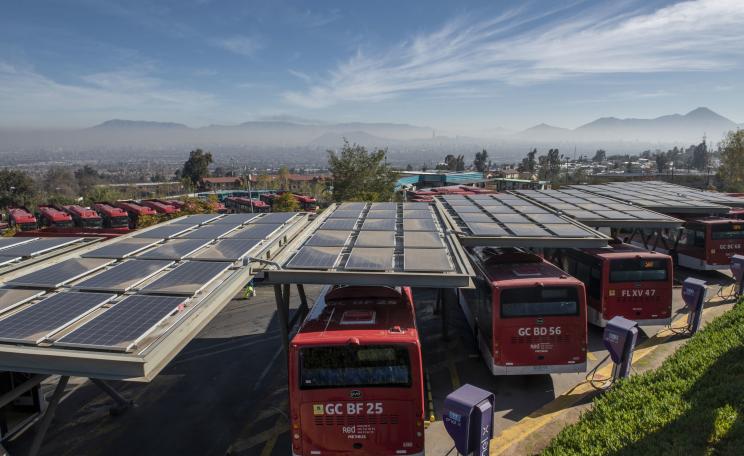It’s likely Trump’s apocalyptic politics will intensify while the country descends into dysfunction and chaos.
It’s all over for the green transition. Donald Trump, the newly elected US president, has withdrawn the world's superpower from the Paris Climate Agreement, rolled back environmental regulations, ended support for electric vehicle production, is trying to effectively gut the US Environment Agency and has halted offshore wind projects, tanking the wind sector.
Not content with declaring a war on a non-existent Green New Deal, he is also backing Big Oil and other fossil industries against the threat of the energy transition.
Despite the fact that most of the big shale plays have peaked, and that oil markets are saturated, Trump has declared the US will "drill baby, drill". Corporate behemoths are ditching climate pledges while banks are withdrawing from green funds and putting their money into energy hungry AI ventures.
Revive
Trump’s election seemingly signals the end of the - very short lived - climate transition and arrives against the backdrop of European climate backsliding, farmer’s protests against environmental measures and an increasingly emboldened anti-climate far right. Carbon emissions and temperatures continue to climb.
Yet that pessimistic assumption belies what is really happening and misunderstands what the climate transition actually is. What is coming to an end is the American Empire. And while the transition might be slowing, and far more conflictual than many had hoped, it is most definitely not over.
Europe generated more power from solar energy last year than fossil fuels. Electric car sales continue to out-perform expectations while prices continue to fall. Money is still pouring into the ‘greentech’ sector, with over US$2.1 trillion invested last year, double that invested in fossil fuels. Most analysts don’t see Trump’s policies as changing any of the green market fundamentals.
Policies like Joe Biden’s Inflation Reduction Act or the European Green Deal are not primarily about stopping climate chaos. It would be nice if they were.
But for a decade now government climate policies across the world have put us on track for between 2.5C and 3.4C, with recent efforts bending the curve somewhat under 3C. The aim of climate policies has always been primarily about using climate change to revive the economic fortunes of the wealthy countries of the Global North.
It’s likely Trump’s apocalyptic politics will intensify while the country descends into dysfunction and chaos.
Novel
Call it green capitalism, not effective mitigation. While the history of such policies is rooted in the promise of ‘win-win’ outcomes, where environmental sustainability meets good job growth, the reality is far more prosaic.
Climate policies across the Global North aim to make investing in green industries and innovation financially secure. They are focused on ensuring new renewable energy projects are profitable, that there is demand for heat pumps and electric cars, and that companies can invest without fear of economic losses.
The reason to do this is not primarily to stop climate change, but because for over a decade now the economies of the Global North have been stagnant.
Growth is anaemic, productivity gains have slowed if not stopped. Zombie firms have proliferated while wages and living standards have declined. After the epoch-defining financial crisis of 2008, one inaugurating a period of ‘secular stagnation’, the green transition was supposed to revive the North’s economic fortunes. But the transition is like a game of musical chairs, with only so many countries and companies able to find a seat at the table.
Economic growth needs frontiers to grow. One vital economic frontier is new markets; either new people to sell to or new things to sell that people will buy. It also needs to constantly make labour more productive, forced by competition into finding novel ways to produce more for less expenditure. Frontier technologies promise both.
Electric
Sometimes bundled together with the fourth industrial revolution as an idea, frontier technologies such as AI, biotechnology, automation, renewable energy and new material science offer three things that enable economic growth. They promise to radically increase productivity; they create new markets; and they offer powerful returns on investment.
They also, and this is no coincidence, offer the potential for a massive surge in military power. National dominance in some or all of the key frontier industries has the potential to translate into a dominant economic position globally, with other countries forced to buy or licence your products and intellectual property. Success creates future wealth and power.
The IRA and Europe’s Green Deal were part of a race to secure a lead, or at least a foothold, in new industries and markets. But the combination of industrial climate denial and delay, cross-party support for fossil industries and relentless anti-climate compromises hobbled the US’s greentech sectors. In the end the transition is a race that China won. Which is why Trump is throwing a tantrum.
It’s not just the case that China is now the world’s sole manufacturing superpower, producing close to a third of total global manufacturing output. It also increasingly dominates most of the crucial frontier technologies.
China manufactures almost 80 per cent of all electric vehicles and holds 80 per cent of the global market share for solar panels, as well as 66 per cent of the market share for wind turbines.
Transition
It is at the forefront of space technology, 5G, and advanced material development. It installed more industrial robots last year than the rest of the world combined. And in areas where the US thought it had a lead – biotechnology, A.I and semiconductors – it has either caught up or is close to doing so.
The US is also well into the collapse of its global political and cultural hegemony, one that started before its complicity with Israel’s genocidal campaign in Gaza.
Trump’s unilateral actions, including dismantling it's not-so-covert foreign interference agencies like USAID, denote a conscious leaning into the post-US world order, where America is just one state amongst many contending world powers, albeit one that is intending on being the first among many.
While it is attempting to force a range of trade settlements on enemies and allies alike – from coercing Europe into accepting American tech-oligarchy dominance to trying to make China revalue its currency in a new “Plaza Accord” (which is doomed to fail) – it is doing so with a view of arresting any further decline and remaining at the top of the global order.
Trump’s actions have to be understood in this light. Trump’s administration is aiming to protect income streams, access to resources and markets, and whole industries from the threat of China’s rise and the green transition. As the US Secretary of State has said: "[T]he postwar global order is not just obsolete; it is now a weapon being used against us.”
Decline
Central to this project is protecting oil and gas. The US is the world’s largest oil and gas producer. The profoundly destructive ‘shale revolution’ underpinned US economic growth over the past decade and provided a ready source of cheap energy. Any decline in oil and gas usage will undermine the US economy.
A substantive transition will strand billions of dollars in US corporate investments. If we add to this the various downstream fossil fuel industries such as power generation and cars, the US stands to lose massive amounts of money and investments to the transition.
Trump’s election and agenda indicates that at least a fraction of the US ruling elite understands it’s holding a losing hand, and that decline is underway.
Trump himself has repeatedly referenced US decline, emphasising the need to assert independence against foreign powers, often framed as a question of fossil freedom and in opposition to regulation. He has consistently talked about the decay of modern life, marked by the figures of woke Marxist professors and Antifa militants, all conspiring to destroy the family, overthrow God and erode individual liberty.
Trump said he was “fighting to save the American Dream. We’re fighting to protect the suburbs, to preserve our way of life”. This meant "bringing back our jobs, our factories, and our industries”. Trump declared he would bring manufacturing back and maintain the US’s energy independence, while defending the police and not letting protestors turn cities into war zones. “From this moment on, America’s decline is over.”
Ecological
Except it’s not.
Trump’s tone, and that of much of the MAGA right, is profoundly apocalyptic. And for good reason. Trump is a revelation of the truth of the American Century; what it has always been, despite claims of freedom and peace and sustaining the liberal world order.
Worse than this, Trump also has let slip the truth of internal decline that the Democrats refused to acknowledge. While decrying American’s sense of national decay as little more than ‘vibes’, the truth is the economy isn’t working for most people.
The shift from a unipolar to multipolar world, where the US no longer has unmatchable economic or military power, where its political and cultural hegemony has waned, is a profound threat to both US business interests and the American way of life.
Without global dominance the US won’t have the ability to drain resources and wealth from the rest of the world. As the world’s major consumer nation, accounting for a full third of global world consumption, the US drains over US$500 billion per year from the rest of the world in unequal exchange.
The American way of life is not only not viable for the planet, but also already under threat. Without the ability to appropriate a massively disproportionate share of the world’s economic and ecological value, there is no high-consumption, high-waste American way of life.
Order
To maintain it Trump is going after the only countries he feels America can bully uncontested – it’s allies. China is already too much of a military and economic threat to take on with much more than symbolic gestures. His aim here is to ensure allies are properly supplicant, and that the US is able to extract sufficient tribute to maintain its imperial mode of life.
It's far from clear that this will work as a strategy. Attempts to bully Canada and Colombia resulted in few real concessions, even though they were both spun as huge victories. Europe is far from feeble, and is already setting a middle path focused on collaboration with China, while the rest of the world is quietly pivoting away from the US.
Given many of Trump’s programmes will increase unemployment and weaken social protections, while increasing inflation and squeezing American consumers, it is likely that the failure to bully ex-allies into subsidising the US’s imperial lifestyles will accelerate social decline, radically increasing the internal political instability within the US.
As climate impacts mount, costing billions per year and making entire regions increasingly uninhabitable, ending the American dream, it’s likely Trump’s apocalyptic politics will intensify while the country descends into dysfunction and chaos.
In this way, the green transition will continue, without America, and into a more uncertain global order.
This Author
Nicholas Beuret is a lecturer at the University of Essex researching the politics and political economy of climate change and the green transition. His book, The War Against Green Capitalism, is out with Verso in September 2025.







